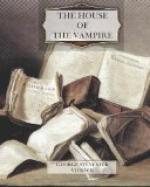Ernest became even more thoughtful. “Yes,” he observed, “there is something in what you say.” Then, pacing the room nervously, he exclaimed: “And still I find it impossible to believe your explanation. Reginald a vampire! It seems so ludicrous. If you had told me that such creatures exist somewhere, far away, I might have discussed the matter; but in this great city, in the shadow of the Flatiron Building—no!”
She replied with warmth: “Yet they exist—always have existed. Not only in the Middle Ages, but at all times and in all regions. There is no nation but has some record of them, in one form or another. And don’t you think if we find a thought, no matter how absurd it may seem to us, that has ever occupied the minds of men—if we find, I say, such a perennially recurrent thought, are we not justified in assuming that it must have some basis in the actual experience of mankind?”
Ernest’s brow became very clouded, and infinite numbers of hidden premature wrinkles began to show. How wan he looked and how frail! He was as one lost in a labyrinth in which he saw no light, convinced against his will, or rather, against his scientific conviction, that she was not wholly mistaken.
“Still,” he observed triumphantly, “your vampires suck blood; but Reginald, if vampire he be, preys upon the soul. How can a man suck from another man’s brain a thing as intangible, as quintessential as thought?”
“Ah,” she replied, “you forget, thought is more real than blood!”
XXV
Only three hours had passed since Ethel had startled Ernest from his sombre reveries, but within this brief space their love had matured as if each hour had been a year. The pallor had vanished from his cheeks and the restiveness from his eyes. The intoxication of her presence had rekindled the light of his countenance and given him strength to combat the mighty forces embodied in Reginald Clarke. The child in him had made room for the man. He would not hear of surrendering without a struggle, and Ethel felt sure she might leave his fate in his own hand. Love had lent him a coat of mail. He was warned, and would not succumb. Still she made one more attempt to persuade him to leave the house at once with her.
“I must go now,” she said. “Will you not come with me, after all? I am so afraid to think of you still here.”
“No, dear,” he replied. “I shall not desert my post. I must solve the riddle of this man’s life; and if, indeed, he is the thing he seems to be, I shall attempt to wrest from him what he has stolen from me. I speak of my unwritten novel.”
“Do not attempt to oppose him openly. You cannot resist him.”
“Be assured that I shall be on my guard. I have in the last few hours lived through so much that makes life worth living, that I would not wantonly expose myself to any danger. Still, I cannot go without certainty—cannot, if there is some truth in our fears, leave the best of me behind.”




